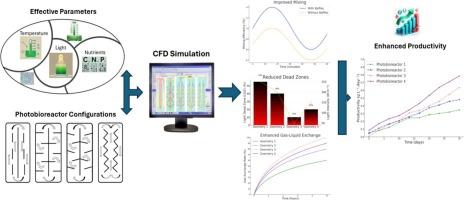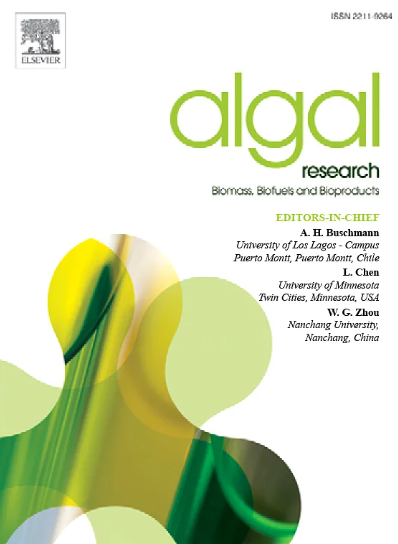应用计算流体动力学优化微藻光生物反应器
IF 4.6
2区 生物学
Q1 BIOTECHNOLOGY & APPLIED MICROBIOLOGY
Algal Research-Biomass Biofuels and Bioproducts
Pub Date : 2024-09-18
DOI:10.1016/j.algal.2024.103718
引用次数: 0
摘要
人们对培养微藻以生产高价值产品的兴趣与日俱增,这推动了开发更高效的微藻光生物反应器(封闭式培养系统)。与开放式培养系统相比,封闭式光生物反应器(PBR)具有多项优势,包括占地面积小、生产效率高、能够保持受控环境以及可扩展的商业化生产。计算流体动力学(CFD)为模拟微藻培养系统的流动条件和分析可能影响培养关键因素(如光照(波长、强度和照射时间)、营养物质的可及性和混合)的操作参数提供了一个强大的工具。此外,利用 CFD 进行几何修改可加快设计过程,并大大减少对反应器配置和相关成本进行全面、经验性探索的需要。本文全面综述了 CFD 在各种微藻培养系统中应用的最新进展,并特别关注平板光生物反应器的不同几何形状优化。本综述考察了在 CFD 框架内采用各种多相和湍流方法模拟反应器内流体流动和湍流的最新研究,旨在改善流动特性,提高微藻产量。具体而言,研究人员探讨了 CFD 在优化平板光生物反应器中的应用,研究了一系列挡板和喷射器配置,以提高微藻产量。此外,还讨论了采用 CFD 的优势,并概述了未来 CFD 在微藻培养中的潜在应用。本文章由计算机程序翻译,如有差异,请以英文原文为准。

Application of computational fluid dynamics in optimizing microalgal photobioreactors
Developing more efficient microalgal photobioreactors (closed cultivation systems) is impelled by increasing interest in microalgal cultivation to produce high-value products. Compared to open cultivation systems closed photobioreactors (PBRs) offer several advantages, including the potential for high productivity in a small footprint, ability to maintain a controlled environment, and their scalability for commercial production. Computational Fluid Dynamics (CFD) provides a powerful tool to simulate flow conditions of microalgal cultivation systems and analyze operational parameters which may affect cultivation key factors such as light (wavelength, intensity, and period of exposure), accessibility to nutrients, and mixing. Besides, geometric modifications employing CFD can accelerate the design process and considerably reduce the need for a thorough, empirical exploration of reactor configurations and the associated costs. This paper provides a comprehensive review of recent updates on the application of CFD in various microalgal cultivation systems with special focus on different geometry optimization of flat plate photobioreactors.
This review examines recent studies that have employed various multiphase and turbulence methods within the CFD framework to simulate fluid flow and turbulence within reactors, aiming to improve flow characteristics and enhance microalgal productivity. Specifically, the application of CFD in optimizing flat plate photobioreactors is explored, with researchers investigating a range of baffles and sparger configurations to enhance microalgal productivity. Additionally, the advantages of adopting CFD are discussed, and the potential future applications of CFD in microalgal cultivation are outlined.
求助全文
通过发布文献求助,成功后即可免费获取论文全文。
去求助
来源期刊

Algal Research-Biomass Biofuels and Bioproducts
BIOTECHNOLOGY & APPLIED MICROBIOLOGY-
CiteScore
9.40
自引率
7.80%
发文量
332
期刊介绍:
Algal Research is an international phycology journal covering all areas of emerging technologies in algae biology, biomass production, cultivation, harvesting, extraction, bioproducts, biorefinery, engineering, and econometrics. Algae is defined to include cyanobacteria, microalgae, and protists and symbionts of interest in biotechnology. The journal publishes original research and reviews for the following scope: algal biology, including but not exclusive to: phylogeny, biodiversity, molecular traits, metabolic regulation, and genetic engineering, algal cultivation, e.g. phototrophic systems, heterotrophic systems, and mixotrophic systems, algal harvesting and extraction systems, biotechnology to convert algal biomass and components into biofuels and bioproducts, e.g., nutraceuticals, pharmaceuticals, animal feed, plastics, etc. algal products and their economic assessment
 求助内容:
求助内容: 应助结果提醒方式:
应助结果提醒方式:


